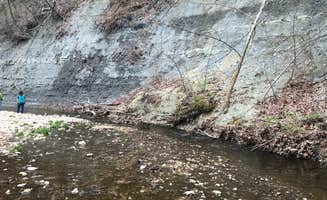Cuivre River State Park sits approximately 70 miles northwest of Louisiana, Missouri, at an elevation of about 500-650 feet. The surrounding terrain features wooded hills and valleys carved by the Cuivre River watershed, with humid continental climate patterns producing hot summers and cold winters. Fall camping often offers ideal conditions with temperatures between 50-70°F during the day and minimal rainfall compared to spring months.
What to do
Lake activities and rentals: At Cuivre River State Park Campground, visitors can enjoy fishing, swimming, and boating on Lincoln Lake. "This campground has a lake you can rent kayaks for. They have a small store at the check in booth. It also has an accessible fishing dock that is covered," notes Kayla S. The fishing dock provides accessible options for anglers of all abilities.
Trail exploration beyond equestrian paths: Non-equestrian campers find extensive hiking options across multiple state parks. At Siloam Springs State Park, "You can rent kayaks, canoes, and boats and fish in many locations. Great for horse back riders too!" according to Hannah S. The park maintains trail systems suitable for day hikers and backpackers alike.
Stargazing opportunities: The rural location creates minimal light pollution for night sky viewing. At Indian Creek Campground, one camper observed "Total darkness, perfect for stargazing" and noted the "Super quiet after hours" environment that enhances the experience. Many sites throughout the region offer unobstructed sky views in designated open areas.
What campers like
Privacy between sites: Many horse campgrounds near Louisiana, Missouri feature thoughtfully spaced sites. As Cody S. noted about Cuivre River State Park, "Campground is quiet and has big campsites." The generous spacing allows equestrians to maintain comfortable distances between animals and equipment.
Wildlife encounters: The natural woodland setting attracts diverse wildlife. "Campground is beautiful and very woodsy. We saw bunnies hopping around and when we first arrived to our site a deer was grazing nearby, such a bonus!" reports Maria E. about her stay at Cuivre River State Park. Dawn and dusk offer prime wildlife viewing opportunities.
Well-maintained facilities: McCully Heritage Project demonstrates the regional commitment to upkeep. "There's a house to rent or primitive camping trails have a map but need a little more marking on newer sections. Very well maintained. Neat look out points," according to Alicia B. Many area campgrounds receive regular maintenance throughout the camping season.
What you should know
Seasonal considerations: Water availability varies throughout the year at many equestrian camping facilities. Water facilities may close during winter months at several parks, requiring campers to bring their own supply during colder seasons.
Insect preparation: Summer brings increased insect activity throughout the region. "Bridle paths are well-marked but can become buggy during summer months, requiring appropriate protection for both horses and riders," according to local reports. Appropriate repellents for both humans and animals are essential during peak summer camping.
Site selection strategy: At Frank Russell Campground, site features vary considerably. One camper noted: "Even though it rained like crazy. Me and my husband loved this spot, especially with 3 perfect trees close enough to put our hammocks up!" Understanding specific site features helps equestrian campers select locations suitable for their setup.
Tips for camping with families
Beginner-friendly riding options: Multiple equestrian campgrounds offer trails specifically designed for less experienced riders. The gradual terrain and well-marked paths provide safe options for families introducing children to trail riding.
Playground access: Some facilities include dedicated recreation areas. At McCully Heritage Project, a camper mentioned, "I just love the bridge across the pond. We had a picnic and the kids got to play on the playground equipment." These amenities provide alternative activities when children need breaks from riding.
Educational opportunities: Daniel Boone Conservation Area offers multiple learning experiences. The area includes interpretive signage about local ecology and history. "There's some stocked ponds to fish in and trails to explore. We rode the Katy Trail which is only 3.5 miles down the hill from here," shares Erik R., highlighting activities beyond horseback riding.
Tips from RVers
Site dimensions and levelness: RVers should research specific site dimensions before booking at equestrian campgrounds near Louisiana, Missouri. At Frank Russell Campground, a visitor discovered "Nice new concrete sites with fire pit, full hookup. Great trails and fishing lake, with concrete sidewalk and benches around it to make fishing easily accessible."
Generator policies: Rules regarding generator use vary significantly between facilities. Some equestrian campgrounds restrict generator hours or prohibit them entirely to maintain the natural atmosphere and avoid disturbing horses. Check specific campground regulations before arrival.
Water and electric access: Whetstone Conservation Area offers basic amenities with some limitations. "Super well maintained conservation area, 5 camp sites with fire pits and picnic tables. Several ponds and a larger lake but it was currently being repaired so it's very low," reports Kayla W. RVers should confirm hookup availability before arrival, as some equestrian areas provide only basic facilities.


